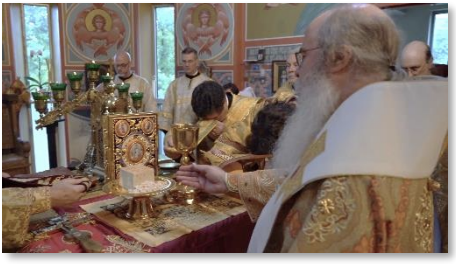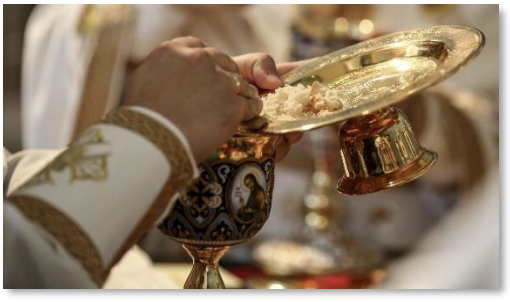Christ’s Sacrifice
Besides understanding Jesus’ death in terms of justification and repayment of debt, the theme of sacrifice (represented in the “Rs” as “reparation”), is a major part of our heritage, and comes especially to the fore in the priestly prayers of the Anaphora. As St. Gregory Nazianzus reminds us, “We needed a God made flesh and made dead, that we might live.”1
We can see this element of sacrifice in many places of our Liturgy. First, the priest, in preparing and sanctifying the mysteries, re-enacts for us what happened to Jesus on the cross, even to the point of piercing “the lamb.” Secondly, just after the prayers for the catechumens, as he prays, the priest calls what is about to happen a “bloodless sacrifice.”
And finally, in the Anaphora, we hear about Christ’s body broken for us and the blood of the New Covenant shed for us and for many. Indeed, the Deacon prays that the gifts offered will be received by “our Loving God at his holy, heavenly, and spiritual altar as an offering of spiritual fragrance.” This language of altar, reception, and fragrance is reminiscent of Old Testament sacrifice, such as when Noah offered a sacrifice to God in thanksgiving after the flood, and God is said to have “smelled” the odor of the sacrifice and responded in favor (Gen 8:21). We know, having seen the Father in the character of his Son, that He does not need anything, or require to be cajoled to receive the offering that Jesus made, and that we present to him in the mysteries. But the language of sacrifice is aptly used and helps us to grasp the wonder of what He has done for us. “Greater love has no man than this, that a man lay down his life for his friends” (John 15:13). The Father does not require this of an unwilling victim; rather, Son and Father, joined by the sanctifying Spirit, act together in this sacrifice of all sacrifices, for the life of the world.
such as when Noah offered a sacrifice to God in thanksgiving after the flood, and God is said to have “smelled” the odor of the sacrifice and responded in favor (Gen 8:21). We know, having seen the Father in the character of his Son, that He does not need anything, or require to be cajoled to receive the offering that Jesus made, and that we present to him in the mysteries. But the language of sacrifice is aptly used and helps us to grasp the wonder of what He has done for us. “Greater love has no man than this, that a man lay down his life for his friends” (John 15:13). The Father does not require this of an unwilling victim; rather, Son and Father, joined by the sanctifying Spirit, act together in this sacrifice of all sacrifices, for the life of the world.
So, then, there are different biblical and patristic ways of speaking about the atonement, and sacrifice figures strongly among them, as reflected in our prayers in the Anaphora. In his death for us, Jesus makes reparation for the sins committed since Adam, redeeming, or buying us back, representing us truly before the Father, enacting his righteous judgement of acquittal for our sake, recapitulating everything that it is to be human (including our death), rescuing us from Satan, sin, and death, reconciling us to God, and beginning the process of re-creation. We will receive “holy things for the holy,” knowing that the mysteries are for our remaking, the healing of soul and body. Though what happened on the cross, represented in our celebration of the Mysteries, is the high moment of God’s demonstrated love, it is also part and parcel of everything that Jesus is and has done for us. Indeed, we could consider the Son’s sacrifice on the cross as the ultimate expression of his eternal loving obedience to the Father. Always, the Son defers to the Father, though they share mutuality in divinity and honor (John 5:19; 1 Cor 15:27–28). The cross is what this willing submission looks like in our world of sin and death that God aims to renew. What God has done for us in the atonement is so mysterious that we need a multitude of ways to look at it— the Son is our Victor, our Sacrifice, our Reconciler, our Redeemer, and so much more.
If he is our true representative, then we should not be surprised to hear ourselves named towards the end of the Anaphora. We are, of course, right to think of Jesus as our perfect substitute, for only He was good and strong enough to rescue us. Not one of us will ever be asked to grasp the nettle of death in the way that He did, as poetically described in Psalm 21/22:
O God, my God, hear me: why have you forsaken me?
The words of my transgressions are far from my salvation.
O my God, I will cry out by day, but You will not hear me.
And by night, but not for a lack of understanding in me.
But you dwell among the saints, O praise of Israel.
Our fathers hoped in You:
They hoped in You, and You delivered them…
But I am a worm, and not a man;
A reproach of man and despised by the people.
All who see me mock me…
Do not stand off from me, for affliction is near;
There is no one to help…
I am poured out like water,
And all my bones are shattered…
Save me from the lion’s mouth,
My humiliation from the horns of the unicorns.
I will declare Your name to my brethren,
In the midst of the church I will sing to You…
Only He fought the fight with death, darkness, sin, and the enemy to its fullest extent.
The Offering of Ourselves
But from another perspective, Jesus is our representative “Die-er,” showing us what it looks like to be perfectly offered to the Father. And so, the gift of the cross for our sake becomes, by the dignity offered to us by God, the responsibility of the cross for us to carry. In speaking with Peter, just before the Transfiguration, Jesus insisted upon the necessity of his own death (Mark 8:31); immediately after this He spoke about the necessity that his disciples also should be cross-bearers— “If any man would come after me, let him deny himself and take up his cross and follow me” (Mark 8:34).
Our sacrifices, then, are rightly bound up with his, both in our lives, and in the Anaphora, when the priest remembers us before God along with the Theotokos and the blessed saints. To speak of our joining in the sacrifice is not to diminish the uniqueness of Jesus’ action on our behalf. Rather, it gives glory to it, for we learn to echo in our own lives what He has done and offer all that we have to God. The letter to the Hebrews speaks of Jesus offering Himself “and the children God has given” him (Heb 2:13). Even more shockingly, St. Paul speaks of his own suffering and toil among the Gentiles as “making up what is lacking in the afflictions of Christ” (Col 1:24). Certainly, the apostle knew very well that Jesus’ sacrifice is unique. Certainly, he had no illusions regarding his own human weakness and our universal need for a Savior. What he was getting at was that Jesus has called us friends, sent the Spirit in order to make our human sufferings productive, and during his own earthly life promised that we would do greater things—presumably in the area of reaching beyond Israel—than He did in the flesh. Our faithful and joyful witness for the truth, in our lives and in our afflictions, gives glory to the One who has called us, and in whose steps we follow.
We must be careful at this point. Some Protestant expressions of communion are so geared to human effort and sacrifice that one would think that the entire service is all about that. There is even a service contrived by the World Council of Churches that uses various loaves, all representative of different races — “Wonder Bread” for the black community, baguettes for the French, and so on. Those attending this contrived service are given the impression that it is all about us, and that the entire purpose of the Eucharist is to show “unity in diversity.” The unutterable wonder of the cross is nearly forgotten, except as a kind of emblem for human actions of generous acceptance. Jesus is rendered a mere mascot. But this is a tragic abuse of the most solemn moment of our meeting with the Triune God. Instead of politicizing or socializing this Mystery, we are to remain astonished at the utter uniqueness of Jesus’ act.
At the same time, we are taught about his divine power to draw us into his life, so that we, too, become participants in the great recalling of the world to Himself. Not because we underestimate God’s power, but because the Incarnation has drawn all of us to the transforming Lord, do we dare to think that our little voices may sing with his, our little lives be ennobled by his, and little sacrifices be joined to his. And so, the blessed Augustine of Hippo reminds us, as he reminded the Easter baptismal candidates before him, “there you are, on the table; there you are, in the chalice!”2 In our self-offering, we are joined with the sacrifice for all time, that of the God-Man, Jesus. The priest enacts this by placing pieces of bread representing the people of God on the paten, and in the cup. We enact it by formally offering our whole lives to Christ our God. We engage, then, in a purposeful entrance into Jesus’ action—both in word and deed—and follow in the pattern of our great high priest, Christ. Christ feeds us with Himself, and we offer ourselves as a bloodless sacrifice, bound up with the one and only Lamb of God.
The priest enacts this by placing pieces of bread representing the people of God on the paten, and in the cup. We enact it by formally offering our whole lives to Christ our God. We engage, then, in a purposeful entrance into Jesus’ action—both in word and deed—and follow in the pattern of our great high priest, Christ. Christ feeds us with Himself, and we offer ourselves as a bloodless sacrifice, bound up with the one and only Lamb of God.
Footnotes
-
St. Gregory Nazianzus, “Second Sermon on Pascha,” Oration 45.28, author’s translation. Available also at https://www.newadvent.org/fathers/310245.htm (opens in a new tab) ↩
-
Sermon 229, “On the Sacraments of the Faithful,” The Fathers of the Church 38, tr. Muldowney (Washington DC: Catholic University of America Press, 1959), 201-202. ↩